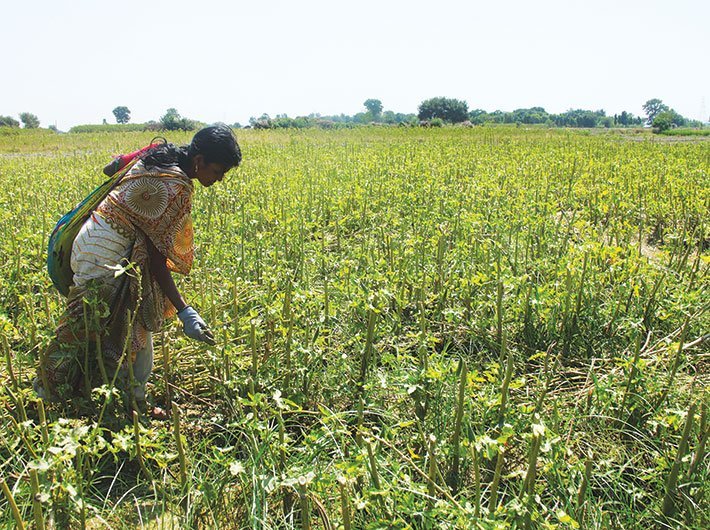With a slew of incentives to propel agricultural growth, the budget was only good news for the farmer
The Indian agriculture is at the verge of a revolution that will modernise the entire food chain in the country. We would not only double the farmer’s income but also increase the country’s food production by many folds and that too in a decade if the much required reforms are carried out.
Today there are excellent business prospects and competitive pricing for the agricultural produce. Statistics show that we Indians are the world’s second largest producers of food. From canned, dairy, processed and frozen food to fisheries, meat, poultry, food grains, alcoholic beverages and soft drinks, the Indian agro industry has dainty areas to choose for business.
It is an opportunity for us to look beyond the food security and government seems to be working on the same track as it has made multiple financial provisions to achieve this goal, bringing a substantial hike in its allocation to the agriculture and allied sector. The sector was allocated Rs. 47,912 crore in 2016-17 budget – 84% more than 2015-16.
Among the string of measures taken is a dedicated long-term irrigation fund that will be set up by NABARD with an initial corpus of about Rs. 20,000 crore. The agriculture credit target is also being raised to Rs. 9 lakh crore for the next fiscal as against the target of Rs. 8.5 lakh crore during 2015-16.
The government has made it clear that more than 4.14 lakh hectares of land will be made cultivable by bringing it under irrigation through an integrated water shed management system within one year. Two crops a year on such a gigantic area would definitely overfill our food bowl.
All other ministries are also contributing their bit to bring back the golden era of agriculture. Rural roads are being built at the rate of 100 km a day under the prime minister’s rural road scheme during the last two years. This is not only improving the connectivity between farms and agro-markets but also bringing healthcare, education and innovation closer to our peasantry.
Where the previous UPA regime had brought in a policy paralysis because of its indecisiveness, the NDA government has given speedy environmental clearances and used every available paisa with honesty. This has smoothened the procedure for land acquisitions, which has further boosted the food processing industry which has been an alien world to Indian agriculturists.
In order to finance the new initiatives, the government has proposed to impose ‘Krishi Kalyan Cess’ of 0.5% on all taxable services. This new cess will come into force from June 1. Economists expect the government to collect considerable revenue from this cess which will be completely dedicated to the agricultural reforms.
Since access to markets is quite critical for the income of farmers, the government is implementing the Unified Agriculture Marketing Scheme and an e-platform to this effect would be launched on the birthday of Babasaheb Ambedkar on April 14.
Further, allocation for the crop insurance scheme, pradhan mantri fasal bima yojana has seen an increase from Rs. 2,598 crore in 2014-15 actuals to Rs. 5,500 crore. Funds for other supporting schemes like Rashtriya Krishi Vikas Yojana and Krishi Unnati Yojana have also been raised substantially.
On top of that, despite two consecutive drought years India had a fairly improved pulses production that has helped in taming the inflation to a great extent. Moreover, funding of Rs. 500 crore as incentive for enhancement in pulses production under the National Food Security Mission to 622 districts has also been approved. Many of these schemes are to be financed as per the restructured formula of the centrally sponsored schemes where the states would be contributing more towards implementation.
As the increased funding to the Prime Minister Fasal Bima Yojana is directed towards subsidising premiums for the existing insured farmers, a major chunk of it would also be used to bring a large number of farmers under the scheme. A point worth mentioning here is that about 95 percent of farmers cultivating paddy and wheat do not have insurance – and in case of cotton cultivating farmers it amounts to 85 percent – and the government is using all available measures to rope them in. Thus, increased money will help in making lives of our farmers better.
The irrigation schemes also got some push as allocation for the Pradhan Mantri Krishi Sinchai Yojana has been raised to Rs. 3,530 crore from Rs. 3,427 crore. It has also registered a higher allocation of Rs. 540 crore under the department of agriculture, cooperation and farmers’ welfare in the current budget as compared to last year’s.
Thus, all in all, we can conclude that it has been the most pro-farmer budget in a long, long time, in which even minute issues concerning agriculture growth have been taken care of as the finance minister has allocated optimum funds for all the schemes which may bring in another green revolution.
Goenka is secretary, Uttan Krishi Sanshodhan Sanstha, Thane, and member, task force-IT, ministry of shipping, highways and road transport.
This article appears in the April 1-15, 2016 issue
